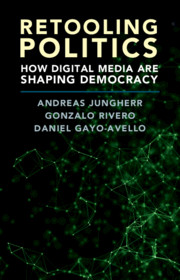Book contents
- Retooling Politics
- Retooling Politics
- Copyright page
- Contents
- Acknowledgments
- 1 The Rise of Digital Media and the Retooling of Politics
- 2 The Flow of Political Information
- 3 Reaching People
- 4 The Effects of Political Information
- 5 Digital Media and Collective Action
- 6 Changing Organizations
- 7 Data in Politics
- 8 Digital Media and Democracy
- 9 Digital Media in Politics
- References
- Index
7 - Data in Politics
Published online by Cambridge University Press: 17 June 2020
- Retooling Politics
- Retooling Politics
- Copyright page
- Contents
- Acknowledgments
- 1 The Rise of Digital Media and the Retooling of Politics
- 2 The Flow of Political Information
- 3 Reaching People
- 4 The Effects of Political Information
- 5 Digital Media and Collective Action
- 6 Changing Organizations
- 7 Data in Politics
- 8 Digital Media and Democracy
- 9 Digital Media in Politics
- References
- Index
Summary
Digital media and technology have created vast new datasets documenting behavior and traits of people. New analytical tools and increasing computational resources facilitate data access and analysis at low cost and with limited effort. The combination of the two has resulted in an increase in the use of data in various areas of politics and administration, building on the logic of state and organizational power, which requires, above all, making things countable. As with earlier cultural and technological developments – such as writing, the printing press, and archives (Goody 1977; Beniger 1989; Scott 1998) – digital media and technology have been used by governments to increase their ability to make more elements social life countable and, by implication, actionable. This trend follows consistent hopes in management, administration, and science that an increase in the available measurement of social life can enable managers, politicians, and scientists to identify underlying mechanisms and to intervene in order to achieve more efficient or normatively desired processes or outcomes (Porter 1996; Fourcade and Healy 2017; Mau 2019). After all, the goals of quantification have never been merely descriptive but are “part of a strategy of intervention” (Porter 1996, 42). The current hopes and fears for a societal transfiguration through digital data arise in this context.
- Type
- Chapter
- Information
- Retooling PoliticsHow Digital Media Are Shaping Democracy, pp. 179 - 211Publisher: Cambridge University PressPrint publication year: 2020
- 1
- Cited by



